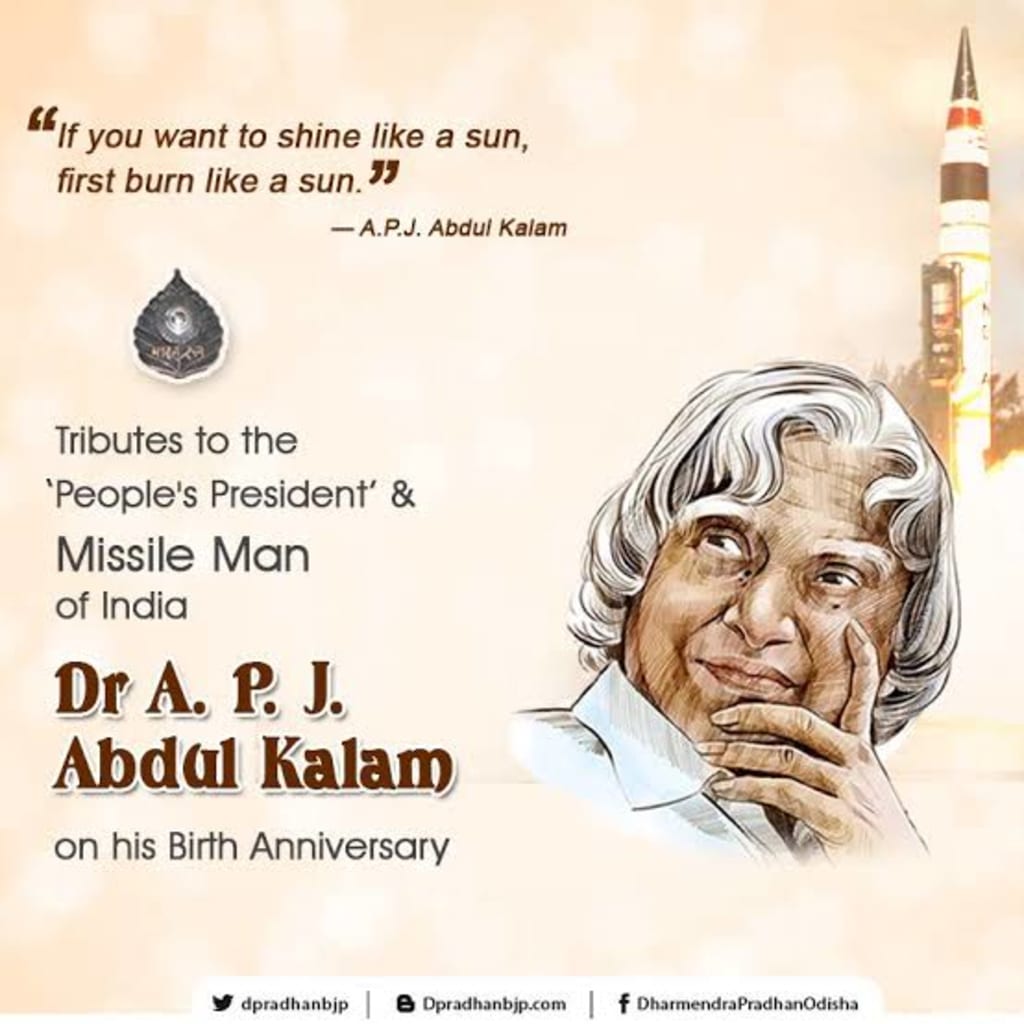The missile man of India
Dr. A.P.J. Abdul Kalam

, also known as the "Missile Man of India," was a renowned Indian scientist and engineer who made significant contributions to the development of India's missile program. He served as the 11th President of India from 2002 to 2007.
Dr. Kalam was born on October 15, 1931, in the small village of Rameswaram in the southern state of Tamil Nadu, India. His father was a boat owner and imam of a local mosque. Despite financial difficulties, Kalam's parents were determined to provide their children with a good education. As a result, Kalam had a strong desire to learn from a young age and was an avid reader.
Kalam graduated with a degree in aeronautical engineering from the Madras Institute of Technology in 1960. He then joined the Defense Research and Development Organization (DRDO) as a scientist. During his tenure at the DRDO, Kalam worked on various projects related to missile development, including the development of the Rohini and Prithvi missiles.
In 1969, Kalam was transferred to the Indian Space Research Organization (ISRO) where he played a key role in the development of the SLV-III rocket, which successfully placed the Rohini satellite into orbit in July 1980. This made India the sixth nation in the world to have the capability to launch satellites.
In the 1980s, Kalam served as the project director for the Integrated Guided Missile Development Program, which aimed to develop a range of missiles for the Indian armed forces. Under his leadership, the program successfully developed the Agni, Prithvi, and Akash missiles.
In 1998, Kalam was appointed as the Chief Scientific Advisor to the Prime Minister and played a key role in the Pokhran-II nuclear tests. These tests were the first nuclear tests conducted by India since 1974 and made India a nuclear-weapon state.
In 2002, Kalam was elected as the 11th President of India. During his tenure, he was known for his focus on education and technology, and was affectionately known as the "People's President." He also worked towards strengthening India's relations with other countries and promoting peace and harmony.
Dr. Kalam was also a prolific writer and an inspiring speaker. He wrote several books, including "Wings of Fire: An Autobiography," "Ignited Minds: Unleashing the Power Within India," and "India 2020: A Vision for the New Millennium," in which he outlined his vision for India's development in the 21st century.
Dr. Kalam passed away on July 27, 2015, while delivering a lecture at the Indian Institute of Management in Shillong, Meghalaya. He was 84 years old at the time of his death.
Dr. A.P.J. Abdul Kalam's contributions to the development of India's missile program and his role in making India a nuclear-weapon state are undeniable. His work has had a lasting impact on the nation's defense capabilities and has helped to establish India as a major player in the field of missile technology. He is remembered for his dedication, hard work, and for being a true patriot who always put the nation first. His legacy lives on through the many young people he inspired, and the many books, articles and lectures he wrote, that continue to inspire and guide future generations of Indians.
In conclusion, Dr. A.P.J. Abdul Kalam, also known as the "Missile Man of India," was a renowned Indian scientist and engineer who made significant contributions to the development of India's missile program. He served as the 11th President of India from 2002 to 2007 and was affectionately known as the "People's President." He was known for his focus on education and technology, and for his dedication and hard work. His legacy lives on through the many young people he inspired, and the many books, articles and lectures he wrote, that continue to inspire and guide future generations of Indians. His contributions to the defense capabilities of India and his role in making India a nuclear-weapon state are undeniable and have had a lasting impact on the nation. Dr. Kalam's untimely death in 2015 was a great loss to the nation, but his legacy will always be remembered





Comments
There are no comments for this story
Be the first to respond and start the conversation.